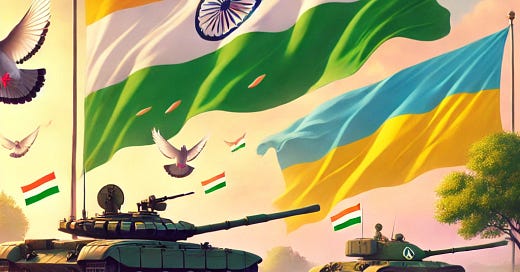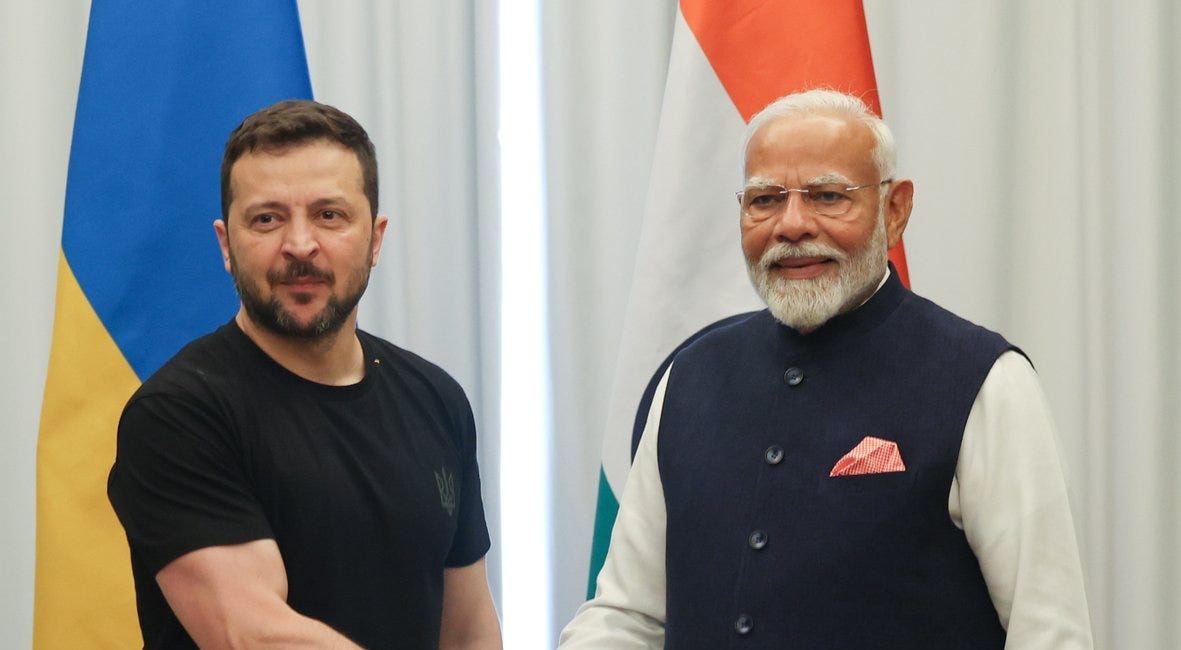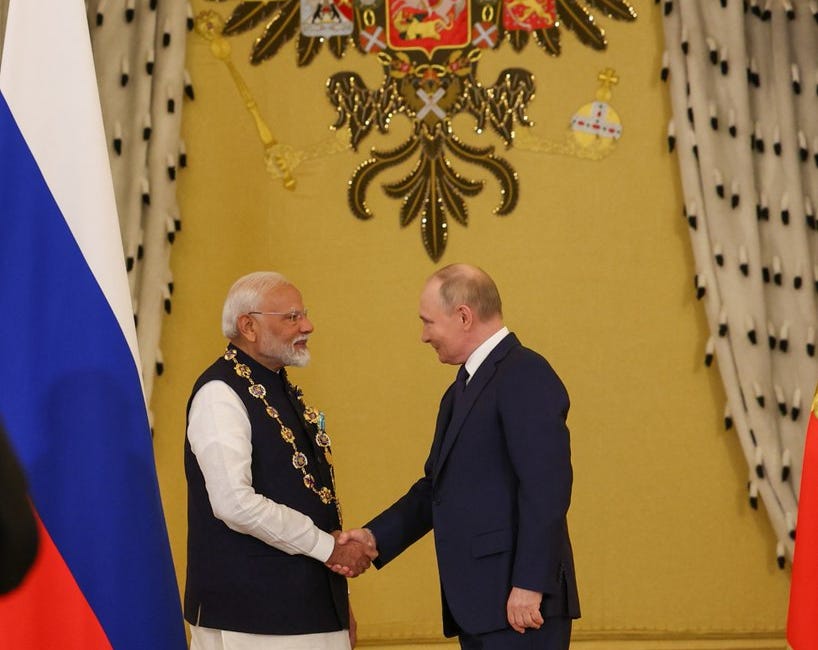Peace and its Possibilities: India’s Potential Role in the Ukraine Conflict
Ukraine: Peace and its Possibilities
The article "Peace & its Possibilities" by C. Raja Mohan brings attention to the evolving dynamics of the Ukraine conflict, now in its third year, and explores the potential for peacemaking. Central to the discussion is India’s role in this global scenario. The article suggests that while India should closely monitor developments in the conflict, there are clear limitations to how much influence it can exert on the peace process.
Growing Momentum for Peacemaking
As the war in Ukraine grinds on, there appears to be a growing momentum for peace efforts. The conflict, which began with Russia's invasion of Ukraine in 2022, has caused significant global disruption, with ramifications for international security, energy markets, and global alliances. As the situation enters its third year, calls for peace are increasing. C. Raja Mohan highlights that India should remain engaged with these developments, not only because of the humanitarian toll but also because any rearrangement of the global order will inevitably impact India's foreign policy.
India’s position in this global conflict is critical given its strategic relationships with both Russia and the Western bloc, particularly the United States. However, the challenge lies in striking a balance between maintaining historical ties with Russia and navigating its partnerships with the West. As Mohan points out, the role India can play is not as a dominant mediator but rather as a careful observer and, when possible, a constructive participant in peace diplomacy.
The Keys to Peace Lie in Washington
One of the key points raised in the article is that both Russia and Ukraine acknowledge that the "keys to peace" largely lie in Washington. The United States has been a major player in supporting Ukraine, both financially and militarily, while also imposing severe sanctions on Russia. With the upcoming U.S. presidential election in 2024, the political dynamics in Washington could significantly alter the trajectory of the conflict. Any major shifts in U.S. foreign policy could either accelerate peacemaking efforts or intensify the conflict.
Given these realities, Mohan suggests that India's role in the Ukraine conflict may be limited. The country has significant diplomatic clout but lacks the direct influence to shift the balance of power between the key players—Russia, Ukraine, the U.S., and European nations.
India's Potential for Peace Diplomacy
The article also speculates about India’s potential as a mediator or facilitator in future peace negotiations. While India has long maintained a policy of non-alignment, its role in global diplomacy has been evolving. Prime Minister Modi has made efforts to maintain dialogue with both Russia and Ukraine, and there is speculation about possible visits to both countries. These diplomatic gestures, while important, are primarily symbolic, aimed at maintaining India’s strategic autonomy and keeping it relevant in the global discourse.
However, Mohan emphasises that India must be realistic about its limitations. While India has some capacity to influence peace dynamics, it lacks the leverage required to significantly alter the course of negotiations. The primary focus of India’s diplomacy in this context remains on mitigating the economic impacts of the conflict, such as rising energy prices and disruptions to food security, rather than steering the peace process.
Respectful Disagreement: A Reality Check on India’s Influence
While the article presents an optimistic view of India’s potential role in the Ukraine peace process, there is room for a more cautious assessment. India’s position in this conflict is indeed complex, but it is important to recognise the limitations of its influence. Despite maintaining cordial diplomatic relations with both Russia and Ukraine, India does not have the direct economic or strategic leverage necessary to significantly shape either party’s stance in the conflict.
Historically, India has balanced its relationships with global powers, adhering to a policy of non-alignment. In the context of the Ukraine war, this balancing act continues as India strives to maintain ties with Russia while also engaging with Western powers. This delicate balancing act constrains India’s ability to play a decisive role in the peace process. Additionally, as mentioned in the article, the key stakeholders in the conflict—Russia, Ukraine, the United States, and European nations—have far more direct stakes and influence in determining the outcome. Nevertheless, India can strive to be a peace catalyst if not one of the active ingredients.
India's Diplomatic Posture: Symbolic but Limited
Prime Minister Modi’s recent visits to Russia and Ukraine, while diplomatically significant, were aimed at demonstrating India’s commitment to global engagement rather than asserting substantial influence on the peace process. These visits could be interpreted as efforts to remain informed and relevant in international affairs, particularly as India seeks to enhance its global stature. However, they do not necessarily translate into the ability to shape the conflict’s resolution.
It is also worth noting that India’s domestic priorities, including managing the economic fallout of the conflict, have been a central focus of its foreign policy. India has been primarily concerned with mitigating the impacts on its own energy security and food prices, rather than actively engaging in peace negotiations. While this stance is understandable, it further limits India’s capacity to emerge as a key player in resolving the Ukraine crisis.
Conclusion: A Responsible Stakeholder, Not a Mediator
In conclusion, while India’s diplomatic efforts in the context of the Ukraine conflict are commendable, it is crucial to recognise that its capacity to significantly influence the peace process is limited. As C. Raja Mohan rightly points out, India should remain engaged in global discussions on peacemaking. However, its role is more likely to be that of a responsible global stakeholder, contributing where it can, rather than acting as a decisive mediator.
India’s primary contribution to the Ukraine1 conflict may lie in advocating for global stability and mitigating the secondary impacts of the war on energy and food supplies, rather than playing a central role in shaping the outcome of the conflict itself. In this complex geopolitical landscape, India’s strength will be in maintaining its strategic autonomy while navigating the delicate balance of its international relationships2.
PM Modi in the August Company of Ukraine President Zelenskyy
Contextual Overview and Significance of the Visit
PM Modi Honoured with the Order of St. Andrew by Russia
Award Presentation to Prime Minister Narendra Modi







